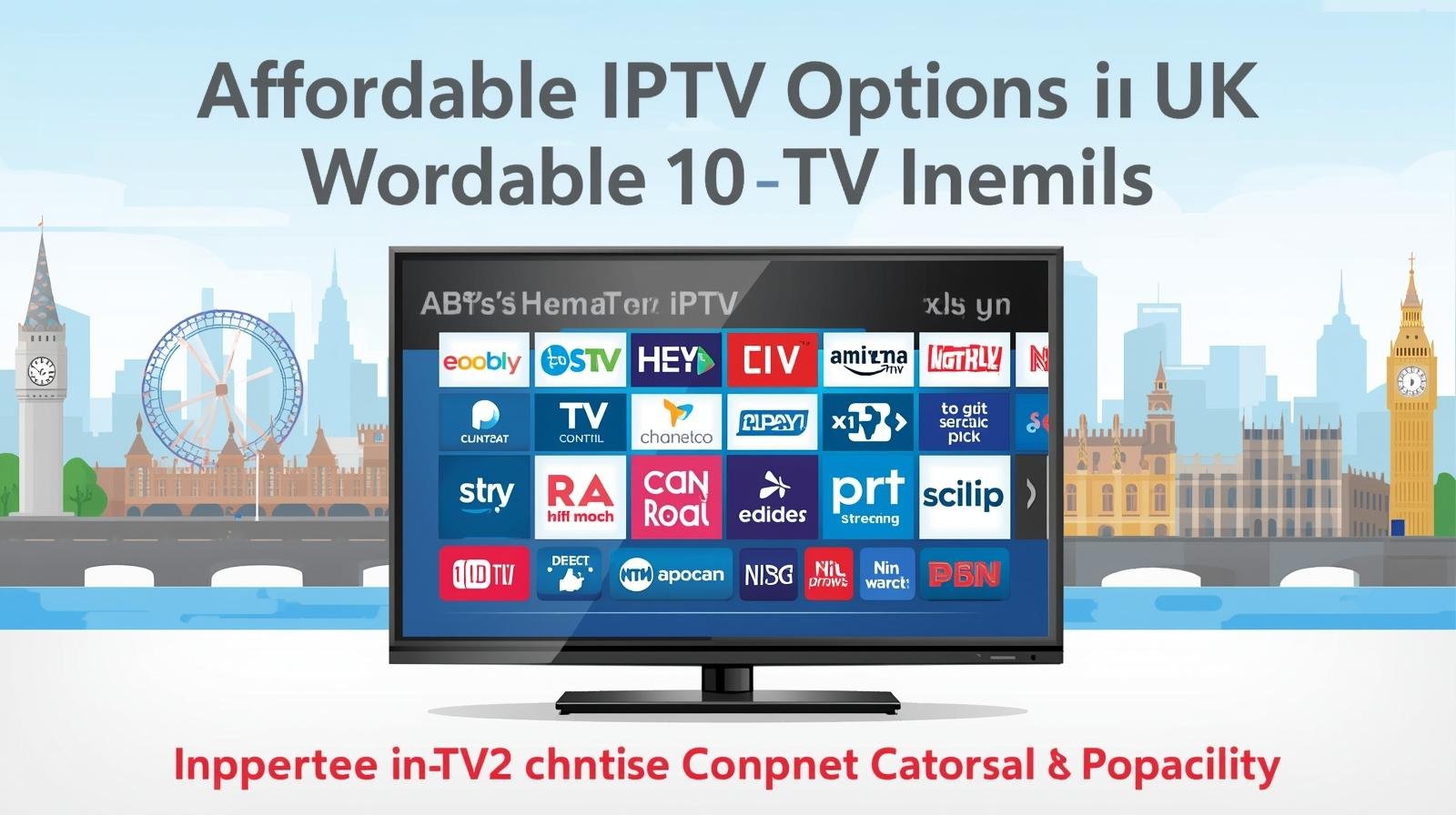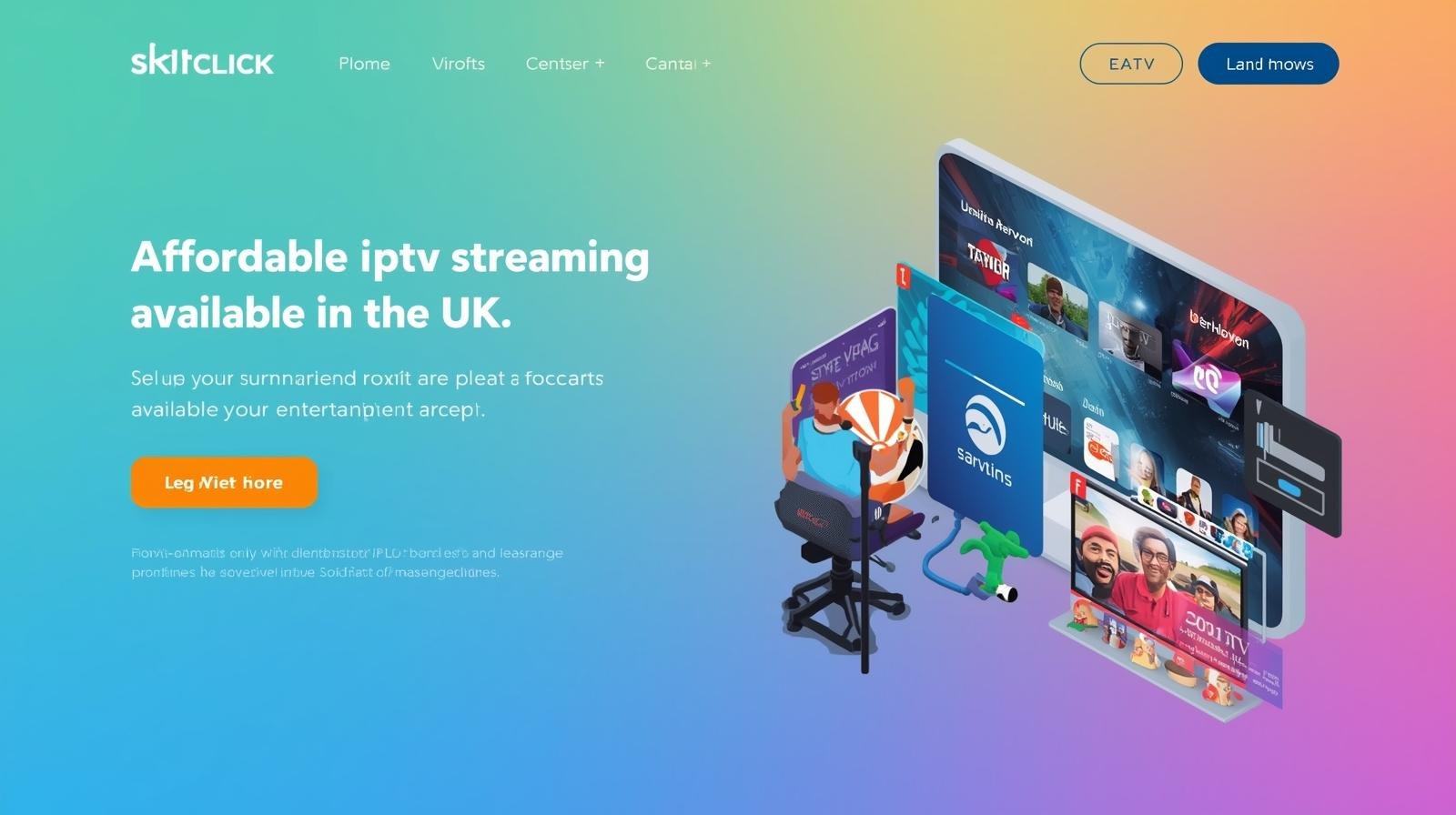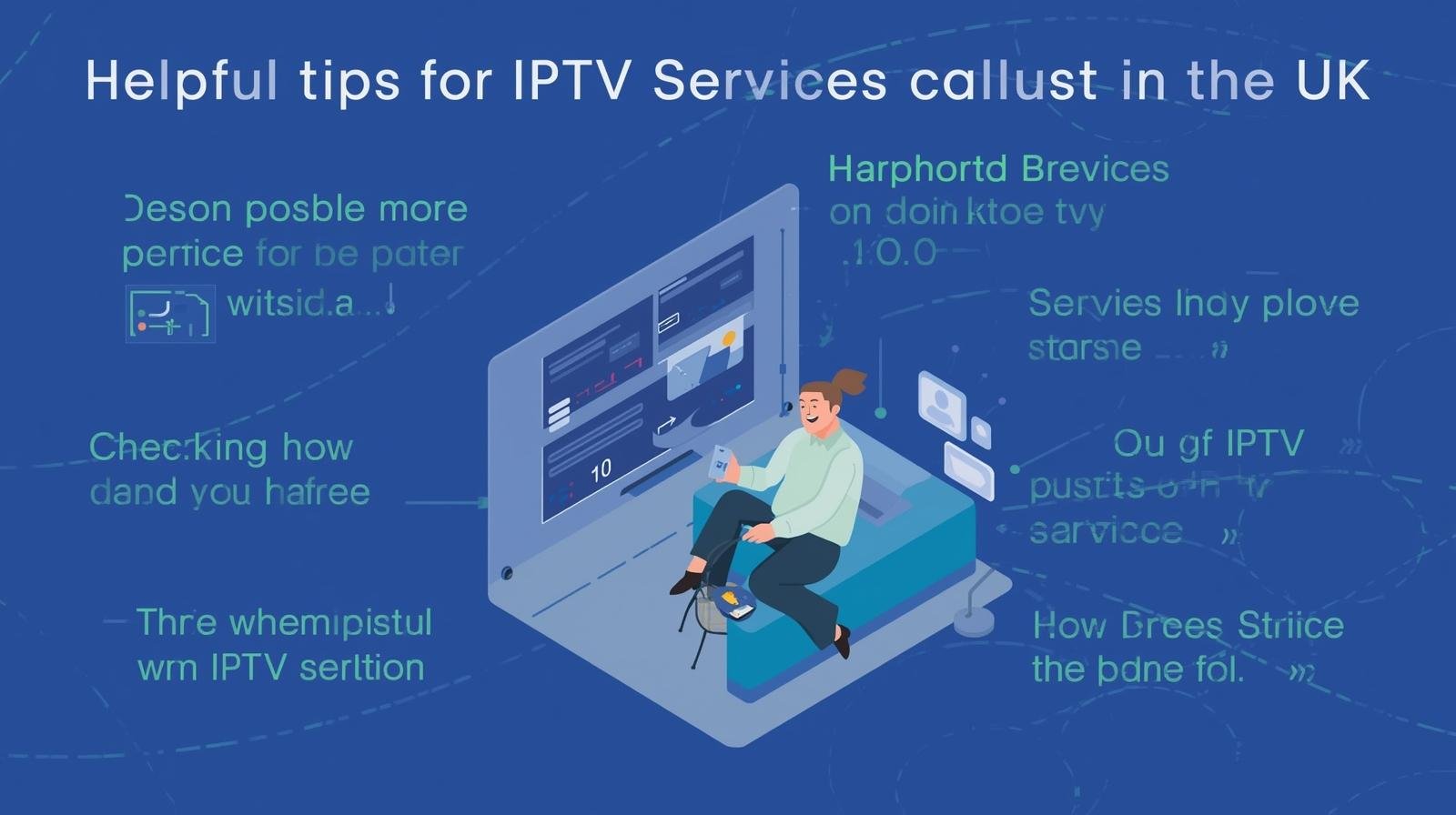Cutting the cord doesn’t have to break the bank. In the UK, IPTV (Internet Protocol Television) has matured into a flexible, feature-packed, and—crucially—affordable way to watch TV. Whether you live in a student flat, shared house, single-occupancy apartment, or a family home, there are cost-effective IPTV routes that deliver live channels, on-demand films, sport highlights, and children’s programming without the heavy price tag of traditional satellite or cable bundles. Affordable IPTV Options UK.
This article is a practical, step-by-step guide to getting IPTV on a budget in the UK. I’ll walk you through the cheapest and most reliable device setups, low-cost and free legal services, smart combos and bundles, how to future-proof your setup, tips to avoid hidden costs and scams, bandwidth requirements, and a buying checklist. By the end you’ll know exactly how to build a great, inexpensive IPTV experience tailored to your household.
1. What “IPTV on a budget” really means
“IPTV on a budget” isn’t just about paying the smallest monthly fee—it’s about getting the best value: a reliable picture, the channels you actually use, low setup costs, and minimal monthly overhead. It means:
- Avoiding long-term contracts and expensive hardware installs.
- Combining free legal content and low-cost subscriptions for a tailored lineup.
- Minimising wasted channels and redundant payments.
- Using low-cost hardware that still offers good app and codec support.
- Protecting yourself from illegal services that might look cheap but come with huge risks.
If you prioritise value over vanity (no need for the most premium bundle), you can easily get an excellent experience for a fraction of legacy cable costs.
2. The building blocks: Internet, device, and service
A budget IPTV setup has three essentials:
A. Internet connection
You need a stable broadband connection. For consistent HD streams, target at least 15–25 Mbps for a single stream; 4K needs 25–50 Mbps. For budget users, the trick is choosing the right plan for your household’s concurrent-device needs—don’t overpay for unused capacity, but leave enough headroom for smooth playback.
B. Device (hardware)
You don’t need an expensive set-top box. Cheap streaming sticks and older smart TVs can run IPTV apps well. Important: choose hardware with good app support and up-to-date OS updates (for security and codec support).
C. Service
This is the content source. Options range from free catch-up apps (BBC iPlayer) and ad-supported services to inexpensive SVODs (subscription video on demand) and pay-per-view for big events. Mix and match to keep costs down.
3. Cheap and legal IPTV services in the UK (free + low-cost options)
Start with legal, reputable services. These give you peace of mind, consistent updates, and no malware risk. Affordable IPTV Options UK.
Free & public service apps
- BBC iPlayer: Free to UK users (TV Licence required for live or recorded BBC content). Huge catch-up library.
- ITVX, All 4, My5: Free catch-up services from the main UK broadcasters. Ad-supported but extensive.
- Free ad-supported streaming services (FAST): Platforms like Pluto TV, Tubi, or locally available free channels often carry decent content without a subscription (ad breaks fund them).
Low-cost subscription services
- NOW (Sky’s streaming service): Flexible passes for entertainment, movies and sport (choose the passes you need).
- BritBox: Affordable, good for British drama and classic series (often cheaper than full cable).
- Disney+ / Apple TV+ / Amazon Prime Video: Not the cheapest singly, but rotating and bundling promotions can make them affordable. Amazon Prime includes other perks (shopping, music) which can justify the cost.
Budget-specific IPTV providers
Look for legal, smaller IPTV services or packages offered by ISPs that provide leaner bundles—these often offer “skinny” lineups at lower prices compared to legacy cable. Examples include entry-level plans from ISPs or hybrid OTT bundles with select live channels.
4. The best budget devices for IPTV (sticks, boxes, smart TVs)
Hardware can be cheap and effective. Here are common budget-friendly choices and what to expect:
Streaming sticks (best value)
- Amazon Fire TV Stick / Lite: Often the cheapest route, with wide app support. Fire OS runs many IPTV apps (official and third-party).
- Chromecast with Google TV (affordable model): Integrates with Android ecosystem and supports many apps.
- Roku Express: Simple interface, reliable app store (check UK availability for specific apps).
Why choose a stick? Low purchase price (~£20–£50), plug-and-play, portable, and easily upgraded later.
Entry-level Android TV boxes
If you need more apps, sideloading or expanded codecs, low-cost Android boxes (from reputable brands) offer better performance than cheap sticks, and can handle local playback, external storage and more advanced IPTV apps.
Older smart TVs
If you already own a recent smart TV (Samsung, LG, Sony), try its app store first—many native apps are supported and perform well without extra hardware.
Budget set-top boxes from ISPs
Some ISPs offer affordable or subsidised STBs with managed IPTV built-in. These often have simple billing and support but may lock you to the ISP for service. Good option if you want reliability without fuss.
5. Combining free and paid services: the smart hybrid approach
The smartest budget IPTV setups use a hybrid mix:
- Base layer (free): BBC iPlayer, ITVX, All 4, My5, and at least one FAST platform. This covers a lot of general entertainment and catch-up.
- Niche add-ons (paid): Add one or two cheap subscriptions tailored to your tastes — e.g., BritBox for British drama or Disney+ for family content.
- Occasional rentals: Use transactional VOD (rent a 4K movie for £3–£5) for big films rather than keeping a permanent premium subscription.
This approach keeps monthly costs low while giving access to high-value content. Affordable IPTV Options UK. Affordable IPTV Options UK .You’ll probably find 70–90% of the content you want across the free layer and a single low-cost subscription.
6. How to save on big-ticket channels (sports, movies, premium)
Sports and premium IPTV movie channels are the usual budget-busters. Workarounds:
Short-term passes
Use short-term passes for the months you need them (e.g., a monthly sports pass during football season). Many services offer monthly rolling plans—cancel when the season ends.
Shared accounts (with caution)
Family members sometimes split subscription costs. Be mindful of terms of service; some providers restrict simultaneous streams.
Pay-per-view
For one-off big events (boxing fights, concerts), consider a single-event purchase over a continuous premium subscription.
Free highlights and delayed streams
If you don’t need live action, many sports channels and leagues offer extended highlights free or on cheaper platforms.
7. DIY: Setting up an ultra-cheap IPTV rig step-by-step
Here’s an example build that’s affordable and effective:
Example budget build (under £70 initial cost; ~£5–£10/month)
- Hardware: Buy a Fire TV Stick Lite or Chromecast with Google TV (~£25–£40).
- Network: Use your existing home broadband (ensure 15–25 Mbps). Wired where possible.
- Free apps: Install BBC iPlayer, ITVX, All 4, My5, Pluto TV (or other FAST).
- One low-cost subscription: Add BritBox or Disney+ (or a monthly NOW pass) for niche content you value.
- Optional: Use a cheap VPN only if you travel and need to access UK apps abroad (be aware of provider T&Cs).
Setup tips
- Use an Ethernet adapter for the streaming stick if you experience buffering.
- Update device firmware before installing apps.
- Create user profiles in services to keep recommendations clean.
- If you need recordings, choose a provider or device that supports cloud DVR (some low-cost providers include small DVR allowances).
8. Avoiding illegal IPTV & staying safe online
Cheap can be dangerous if the service is illegal. Affordable IPTV Options UK. Illegal IPTV often offers complete channel bouquets for suspiciously low fees. Risks include:
- Malware and adware in unofficial apps.
- Poor reliability—streams vanish, links break.
- Legal exposure—using unlicensed streams can lead to account suspension or legal notices.
- No customer support or refunds.
How to stay safe:
- Stick to well-known app stores (Amazon Appstore, Google Play, Roku Channel Store).
- Verify provider credentials and look for transparent licensing statements.
- Avoid APKs and third-party stores unless you know exactly what you’re installing and trust the source.
- Read user reviews and community threads from reputable UK forums for feedback.
9. Bandwidth, data caps and ISP considerations for budget users
A budget plan is useless if your broadband can’t handle streaming. Consider:
Assess your needs
- 1 HD stream: ~3–8 Mbps continuous.
- 1 4K stream: ~25–50 Mbps.
- Multiple simultaneous streams: add bandwidth per concurrent device.
Data caps
Some ISPs impose data caps or fair usage policies—check before streaming heavily. If you have limited data, prioritise lower-resolution or download-on-demand when possible.
Peak-time contention
If your area suffers speed drops in the evening, try wired connections, or switch to lower bitrate streams during peak hours. Alternatively, ISP-bundled IPTV with managed QoS can offer better evening reliability.
10. Tips to improve streaming quality without upgrading your plan
You can often improve experience for free or low cost:
- Use Ethernet: Wired connections dramatically reduce buffering.
- Router placement & Wi-Fi configuration: Move the router closer to your streaming devices, use 5GHz for less interference, and avoid micro-wave ovens and dense walls in between.
- Limit background uploads/downloads: Pause large downloads and cloud backups during streaming.
- Adjust streaming quality manually: Many apps let you choose SD/HD/Auto. Select “Auto” or a lower preset to avoid stutters when needed.
- Reboot router periodically: Keeps memory clears and routing optimal.
- Use a better router firmware: If you’re comfortable, inexpensive upgrades (or simple QOS settings) can allocate more bandwidth to streaming devices.
11. Seasonal and temporary subscription strategies (save by timing)
You don’t need a year-round subscription for every service. Smart timing can save dozens per year:
- Sports: Subscribe only for the season or big tournaments.
- TV series: Start a service for a month during a major series release, then cancel.
- Movie releases: Rent individual films rather than keep extra movie bundles.
- Trial stacking: Many services offer free trials. If you time trials and short-term passes carefully, you can watch several months of content with minimal cost—just remember to cancel before billing.
12. Where to spend and where to save: a prioritisation guide
If you have limited budget:
Spend on:
- Reliable broadband (avoid the cheapest throttled plans).
- A reliable, small streaming device (stick or inexpensive box).
- One well-curated subscription that serves your most-watched genres.
Save on:
- Expensive lifetime bundle deals that include channels you don’t watch.
- Multiple overlapping subscriptions with similar catalogues.
- Hardware with features you won’t use (4K when your TV is 1080p).
13. Troubleshooting common budget IPTV problems
Problem: Buffering or pixelation.
Fixes: Switch to wired connection, lower the stream quality, reboot router, check peak-time performance, test other devices to isolate the problem.
Problem: App crashes on cheap sticks.
Fixes: Clear app cache, ensure firmware is up to date, uninstall unused apps to free memory, or upgrade to a slightly better box.
Problem: Geo-restrictions when abroad.
Fixes: Use a reputable VPN that supports streaming (note provider terms), or download/choose services with global availability.
Problem: Lack of DVR or pause-for-live.
Fixes: Choose services that include cloud DVR, or use provider apps that store catch-up content.
14. Future-proofing your budget setup (hardware & formats)
Even if you’re on a budget, plan for the next few years:
- Choose devices with recent OS versions (security & codec support).
- Prefer devices that support modern codecs (H.265/HEVC or AV1) for efficient streaming of HD/4K.
- Buy slightly above minimum RAM/storage for snappier UI performance on sticks/boxes.
- Consider modularity: Buy a simple stick now and upgrade to a better box later—your subscriptions easily follow your account.
This approach keeps initial costs low while avoiding forced replacements.
15. Conclusion — the cheapest path to a great TV experience
IPTV on a budget in the UK is not only possible—it’s the smart, modern choice for price-conscious viewers. By mixing free legal services with one or two targeted, low-cost subscriptions, using an inexpensive but capable streaming stick, and optimising your home network, you can replicate most of what satellite or cable offers—often with better convenience and far lower ongoing costs. Affordable IPTV Options UK.
Key takeaways:
- Start with free catch-up apps and FAST platforms.
- Add only one or two paid subscriptions aligned with your viewing habits.
- Use cheap, widely supported hardware like Fire TV Stick or Chromecast with Google TV.
- Test your broadband and prefer wired connections for reliability.
- Avoid illegal IPTV services—cheap can be costly in the long run.
If you want, I can help you build a tailored budget plan based on your household size, favourite genres, and current broadband speed. Tell me how many people live in your house and what kinds of shows you watch most (sport, movies, drama, kids), and I’ll design a low-cost IPTV build with exact services and devices to match.
FAQs
- Can I get a decent IPTV experience for under £10/month?
Yes. By using free catch-up apps (BBC iPlayer, ITVX, All 4, My5) and one low-cost subscription (e.g., BritBox or Disney during a promotion) plus occasional rentals, you can keep average monthly spend under £10 while accessing a broad range of content. - Is a cheap Fire TV Stick good enough for IPTV?
For most users, yes. The Fire TV Stick Lite or basic Chromecast is powerful enough for HD streaming and runs the major UK apps. If you want multiple 4K streams or smoother performance with many apps, consider a slightly more powerful box. - What’s the biggest hidden cost with budget IPTV setups?
Data overage or poor broadband causing repeated buffering is the most common hidden cost—either bandwidth charges from limited data plans or the time/money spent upgrading routers/lines. Also beware of illegal subscriptions that disappear with no refund. - Can I watch live sports on a budget IPTV setup?
Yes — but live sports often require short-term passes, pay-per-view purchases, or a dedicated sports pass. Using short-term subscriptions during the season or renting big events keeps costs down. - Is using a VPN necessary for IPTV?
Generally no for UK-based, legal services. VPNs are useful if you travel abroad and want to access UK-only apps. Be sure to check each service’s terms—some restrict VPN use. IPTV FREE TRIAL


